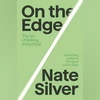ON THE EDGE: The Art of Risking Everything
Author: Nate Silver
Publisher: Penguin Press
Pages: 559
Price: $35
By Tim Wu
Also Read
A common trope in dystopian fiction — The Hunger Games, Chain-Gang All-Stars — is the wealthy society that devotes itself to ever more exotic and expansive forms of gambling. Nate Silver, best known as a statistician and election modeller, makes the case that we are at least partway there.
In his engaging and entertaining new book, On the Edge, Silver describes how the decision-making methods of the professional gambler have spread to encompass a wide swath of human activities, from cryptocurrency investment to the pursuit of a more ethical life. He offers readers an interview-driven tour of the parts of America where the outlooks and incomes depend on sophisticated forms of risk-taking. The result is a glimpse of the economy of the future. Not all of these human calculators are the same. Mr Silver and his subjects live along what he calls “the River.” Upstream are the economists and philosophers who do math and solve logic puzzles for lofty reasons like maximising happiness. Float on a little ways and you will spot the Wall Street traders and stockbrokers. Keep going all the way down to the place where the River meets the shore and you’ll find yourself bobbing among the small-time crypto investors and card sharks. Now you’re really at sea.
No matter their vocation or chosen hobbies, citizens of the River are united in their point of view; to them, everything is a probability, a question of “expected value.” River people look everywhere for an “edge” — an insight into something hard to predict that will give them a profitable betting strategy over the long term.
“When I began working on this book, I knew I’d have conversations with poker players, venture capitalists and cryptocurrency enthusiasts,” Mr Silver writes. “I didn’t think I’d spend a lot of time talking with philosophers.” But Mr Silver found that a lot of the philosophers — and many of the artificial intelligence coders — he spoke to were associated with an intellectual movement related to gambling: Effective altruism.
Like a gambler or an investment banker (or the 18th-century utilitarian Jeremy Bentham), effective altruists are focused on ethical calculations based on outcomes. “Many poker players and many people in finance” don’t care about other people, the Oxford philosopher and leading light of effective altruism Will MacAskill tells Mr Silver. “But some do.”
In his quest to understand people who are obsessed with risk, Mr Silver draws on a wide range of insights. Poker, for example, has taught him that “it’s not just that you should play different hands in different ways; you should play the same hand in different ways” — this randomness creates a fear of the unknown in your opponent, he argues, akin to the unpredictable horror that keeps Russia from dropping the bomb on Ukraine. The bioethicist Peter Singer, a kind of godfather to the effective altruists, has lessons too: In terms of outcomes, someone who allows a child to drown and someone who spends $5,000 on a single high-end sushi dinner instead of on alleviating poverty have the same level of moral culpability.
Alongside its axioms and aphorisms, On the Edge also serves as a rebranding party for Mr Silver. You probably know him as the archetypical political math nerd; he gained attention during the Obama years with dazzling, baseball-like statistical models and election analysis on his website FiveThirtyEight, which for a while had a home at The New York Times. But Mr Silver would like you to know that he’s grown sick of the political world that made him big.
Mr Silver’s disillusionment seems strongly tied to 2016 and the “nits” (normal, risk-averse people) who mistook his election projection that year (Hillary Clinton at a 71 per cent chance of victory over Donald Trump) as a prediction instead of a probability. “From my standpoint — and from the standpoint of people in the River,” he writes, “this was a damned good forecast.” True: Others gave Mr Trump even lower odds.
Now that he’s back to his roots,Mr Silver mostly wants to celebrate his tribe. But what about someone like Sam Bankman-Fried, one of the best-known boosters of effective altruism and rationalist risk-taking as well as a convicted fraudster? Mr Silver, who interviewed Bankman-Fried five times for this book, considers the crypto financier turned felon to be a false prophet. In a memorable chapter full of verbal sparring between the two quants, he confronts Bankman-Fried with all the ways that he was, in fact, highly irrational in his approach to risk. That (for Mr Silver) seems almost as unforgivable as the $8 billion he stole from his customers.
Other potential conflicts in the logical universe of the River are more troubling to Mr Silver. While not a work of political economy, On the Edge ultimately presents an unsympathetic vision of capitalism’s future. If wealth once belonged to those with industrial monopolies, Mr Silver suggests, we are now headed toward a hyper-charged capitalism powered by artificial intelligence, in which the spoils disproportionately belong to those who understand risk. The economy might, he warns, become even “more casino-like: gamified, commodified, quantified, monitored and manipulated, and more elaborately tiered between the haves and have-nots.”
Mr Silver seems exactly right to project a future that belongs to those in a position to take risks. The problem is that many more of us are now like gambling addicts stuck in front of Las Vegas slot machines, fooled into thinking that we’re playing a game we can win, but destined to lose and to lose more the longer we play.
The reviewer is a law professor at Columbia University and the author, most recently, of The Curse of Bigness: Antitrust in the New Gilded Age.© The New York Times News Service

)